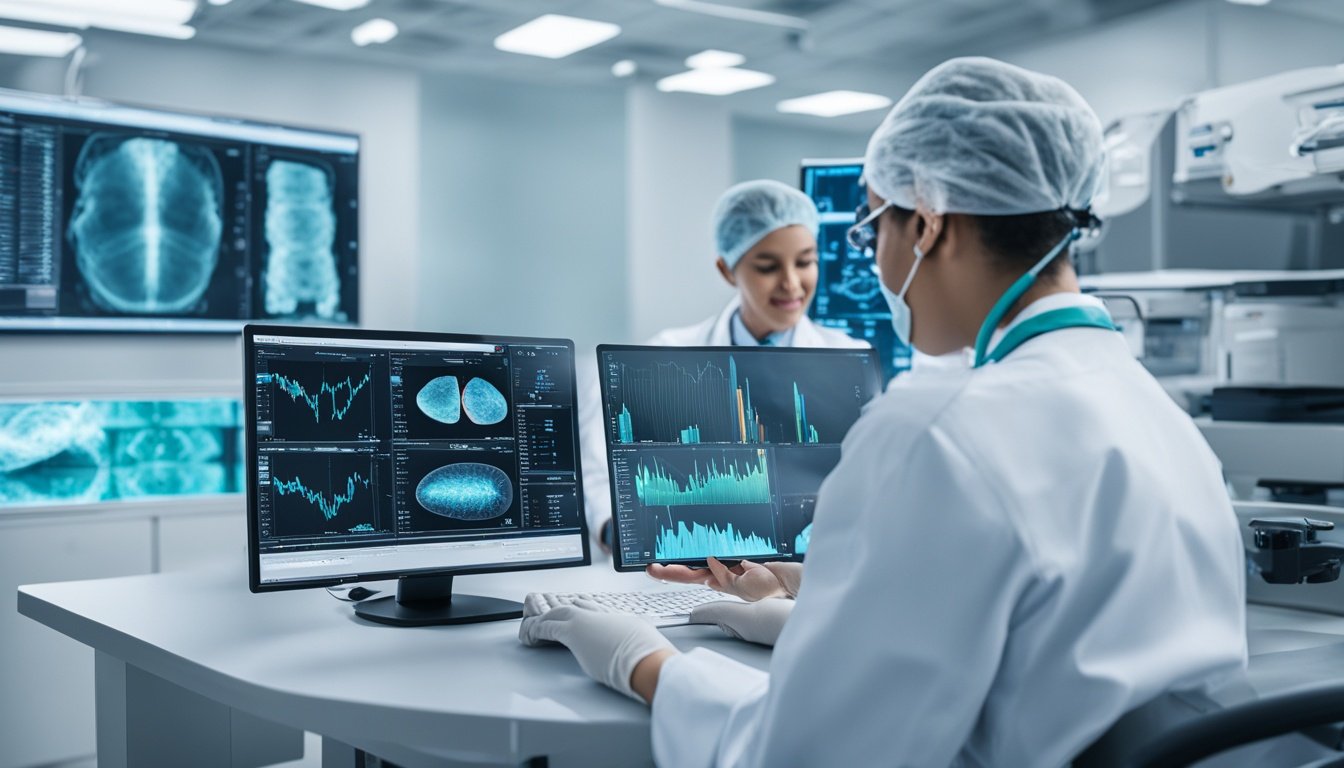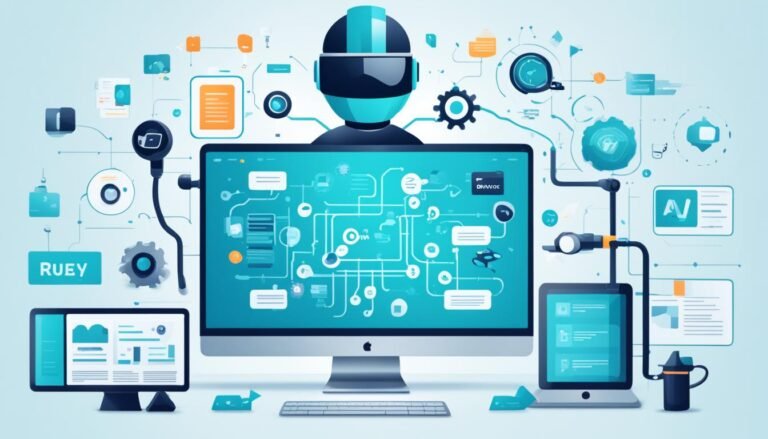AI in Healthcare: Innovations and Future Prospects
Can artificial intelligence actually change the healthcare field, or is it just a buzzword? AI is making big changes, improving how we diagnose, treat people, and run health services. With 63% of US AI companies now using machine learning, its role is clear. This tech is not only making our diagnoses more accurate but is also helping find new medicines.
These AI healthcare tools are changing medicine in ways we didn’t expect. They’re improving patient care, research, and how hospitals run. This is a big shift for the healthcare industry.
Key Takeaways
- AI is pivotal in enhancing diagnostic precision and efficiency.
- Machine learning and deep learning are crucial in precision medicine and radiology.
- AI applications significantly improve early detection and personalized treatment plans.
- Advanced AI tools streamline drug discovery processes and clinical trial predictions.
- AI enhances operational efficiency in healthcare settings through automation and resource optimization.
Introduction to AI in Healthcare
Artificial intelligence (AI) is transforming healthcare. It’s making diagnoses better, workflows smoother, and treatments more personalized. These advances help doctors provide better care and reach more people in need.
The Importance of AI in Modern Medicine
The use of AI in healthcare is key today. In a 2018 survey by Deloitte, 63% of companies said they use AI. This is especially true in medical settings. Experts like Steven Lin and Eric Topol highlight AI’s role in making healthcare fairer.
Before AI, healthcare mainly used ‘if-then’ rules for making decisions. But now, AI’s data-driven methods are taking over. For instance, machine learning helps create treatments unique to each patient. And deep learning is great at spotting cancer early in scans.
Natural language processing (NLP) makes text and speech analysis better, boosting the quality of records and diagnoses. Mixing AI with machine learning makes healthcare not just faster but also smarter for patients.
IBM’s Watson is leading this charge, especially in cancer care and tailored treatments.
AI doesn’t stop with better predictions or diagnoses. It also makes daily hospital tasks smoother. Each year, more than 200,000 robots are placed in hospitals. They help with moving things and work that would be risky for humans. This makes hospitals run better and care for patients more efficiently.
AI-Enhanced Diagnostics
AI is changing how we do diagnostics, making imaging tests better. By using AI, we get clearer CT scans, faster MRIs, and more accurate ultrasound results. This helps in looking at healthcare data in a better way.
Improving Precision in CT Imaging
CT scans have gotten better thanks to AI. Now, we get clearer pictures and use less radiation on patients. This technology helps doctors spot issues more accurately. It also aids in planning better treatments.
Accelerating MR Image Acquisition
MRIs used to take a long time. But, AI is making them quicker. This speeds up exams, helps hospitals work better, and makes MRIs easier to get. These benefits matter a lot for patients and doctors alike.
Simplifying Ultrasound Measurements
AI tools make ultrasound tests more reliable. They help give doctors clear, fast answers. This smooths out testing and keeps results accurate. It’s a big plus for patient care.
Enhancing Radiological Interpretation
AI is vital in reading X-rays, MRIs, and more. It spots hidden issues and makes diagnoses better. This leads to finding problems earlier and improving how we treat patients.
Personalized Treatment Plans
Healthcare is seeing big changes because of AI. It uses patient data to create specific health plans. This is very useful in cancer research and treatment.
Cancer Research and Treatment
AI is making big steps in fighting cancer. It helps predict risks and choose the best treatments. For example, the Rothman Index has lowered sepsis deaths by 29%. This shows how AI can save lives.
Oncora Medical also shows AI’s impact. Their system follows how patients do and refines treatment plans.
Disease Detection
AI is great at finding diseases early, not just in cancer. It made finding multiple sclerosis 44% more accurate and faster. Hospitals using AI saw a big decrease in bad events. AI can really change how we deal with diseases.
AI in Drug Discovery and Development
Artificial Intelligence is changing how we find and create new drugs. It’s making things easier and faster. The market for AI in clinical trials is set to jump from $1.42 billion in 2023 to $8.5 billion by 2035. This means AI’s role in making medicines is growing fast.
For instance, AI greatly helps in getting people into clinical trials. This step usually takes a lot of time, up to one-third of the whole study. But, AI tools that understand human language speed up who can join a trial. They’ve cut this recruitment time in half. And it’s done without lowering important safety checks.
Innovative Drug Discovery Techniques
New AI methods are changing the game in finding better drug treatments. For example, the HINT algorithm can guess if a drug test will succeed or not. It looks at things like the drug itself and who can take it. This helps make smarter choices in drug development.
Some tools like EToxPred also help by guessing how safe a drug might be before it’s tested in humans. AbSci uses AI to make special antibodies for patients. This shows how AI is pushing new ways to make medicine personal and effective.
Delving deeper, we see AI in action picking out the best drug matches. It helps find new antibiotics and design vaccines, like for COVID-19. This shows AI is helpful in tackling big health issues.
But, using AI in making drugs faces hurdles too. Making the data good, safe, and standard is one big task. However, with the FDA’s help, these challenges can be overcome. This teamwork can boost how drugs are tested and made, making it all better for us.
Operational Efficiency in Healthcare
Operational efficiency in healthcare is vital, especially with a growing workforce gap. By 2030, NHS trusts may lack 250,000 staff, with a worldwide shortfall of 18 million health workers. There could be a deficit of 5 million doctors. To fill this gap, using healthcare AI is key. It helps use resources better, manage patient flow, and improve how we communicate.
Streamlining Hospital Operations
AI boosts how hospitals run by making operations smoother. Microsoft 365 Copilot, for example, uses AI insights to manage tasks and make decisions. This leads to better resource use, less work for staff, and overall, operation improvements.
AI tools like Machine Learning, Neural Networks, and Natural Language Processing are already doing a lot in healthcare. They read medical images to help diagnose patients and translate medical notes with speech recognition. They also help make finding new drugs faster and better. This all makes managing hospitals easier.
Even though AI isn’t widely used in treating patients yet, its use in healthcare is growing fast. In the next five years, we’ll see AI used more in hospitals. Over the next ten years, AI will likely play a much bigger role in making healthcare smarter and more efficient. This will help overcome the big shortage of health workers too.
Telemedicine and Remote Monitoring
Telemedicine changes how we receive healthcare, making it easier to get help and to manage our health. It uses AI to get better at treating patients and making health services work well.
Remote Monitoring of Cardiac Patients
Monitoring heart patients from far away is much better because of AI. Doctors can catch heart problems early by looking at ECGs with cloud-based AI. This means health issues are dealt with sooner, and patients don’t have to visit the hospital as often, making things simpler for them.
Improving Healthcare Accessibility
Telemedicine helps people in far-off places and those with little access to healthcare. AI helps with patient needs, making appointments, and handling medicines. This way, health providers can help more people, lower costs, and make quality care available to all easily.
Research shows AI has been a big help in more care during the COVID-19 crisis. It has made telemedicine grow, proving how crucial new tech is in offering remote healthcare smoothly.
Healthcare Data Analytics
Healthcare is always changing, and data analytics plays a big role in this. The use of AI is making healthcare data analytics better. It’s helping in predicting health issues early and making patient care more efficient with data. This changes how healthcare has been done in the past.
Enhancing Predictive Analytics
AI is improving how healthcare data is used to predict health trends better. This can catch serious conditions early, like sepsis, which could save lives. The AI healthcare market is growing fast and will keep getting bigger, focusing more on prediction.
Improving Patient Care Through Data
AI is excellent at finding useful insights in big healthcare data. This helps make treatments more personal and reduces mistakes. For example, AI looks at data from wearable devices to help manage diabetes better for some people.
AI is also fighting against the big cost of healthcare fraud. It checks data for anything suspicious to boost security. And it helps improve communication between patients and doctors, making the healthcare experience better. This is by making data-sharing among healthcare teams smoother, ensuring always the right information is available for patient care.
“AI-driven solutions are providing remarkable advancements in the field of healthcare data analytics, creating a more predictive, precise and personalized approach to patient care.”
All these steps show how powerful predictive analytics in healthcare can be. It helps stop diseases before they start and changes how patients get care.
AI in Surgical Procedures
Since the 1990s, AI has made a major impact on medicine. It’s especially changed the game with machine learning. This tech lets surgeons be more accurate in diagnosis, better in treatment, and super precise in operations. There are three main areas where AI and surgery connect: planning before, guiding during, and using robots to help.
Minimally Invasive Techniques
One big area AI helps is in making surgeries less invasive. This is really good for patients. During surgery, AI can give real-time advice to surgeons. For example, it might warn them if there’s a risk they should look out for. This makes surgery more precise and helps lower the chance of things going wrong.
In colorectal surgery, AI is great at improving how accurately we diagnose problems. By looking at genetic info, it helps find issues early. This leads to better plans for treating patients. Also, in looking for polyps, AI makes the whole process more accurate. This is key in spotting colorectal cancer early and not missing any cases, even the tricky ones.
Enhanced Surgical Outcomes
AI is also changing the game for the better in surgery outcomes. It uses different learning methods to help, like when it’s boxed into supervised or unsupervised categories. One big win is in AI’s help in lessening the mistakes of pathologists in cancer diagnosis. It went from 3.4% of errors to just 0.5% thanks to AI. This shows its massive positive effect.
AI can even predict what’s going to happen in an operation 15 to 30 seconds ahead. It does this by looking at millions of surgery videos. This gives surgeons a heads up on what to expect, letting them adjust if they need to. It means better outcomes for the patients.
Moreover, AI is great at risk assessment and personalized surgery plans. It does this by sifting through huge amounts of patient data. This helps in tricky areas, like selecting high-risk patients or the best donor for an organ transplant. AI really boosts the decision-making process before and during surgery.
AI in Cybersecurity for Healthcare
Today, the world is more connected than ever. It is crucial to protect electronic health info. By 2030, there will be a big gap, needing 18 million more healthcare workers, especially 5 million doctors. This puts more pressure on health groups to safeguard private data.
Securing Electronic Health Information
Keeping ePHI safe is vital in modern healthcare. AI is used to spot and stop potential dangers. Deep learning has made AI good at sifting through lots of data quickly. It can find unusual things that might signal a cyber threat. This is key as there aren’t enough skilled people for cybersecurity jobs.
AI-Driven Cybersecurity Solutions
AI’s role in keeping healthcare data safe is growing. Although AI has been a big deal for some time, it’s now more needed than ever. It’s because AI keeps getting better. Advanced systems are becoming key to keeping health info safe using ML. These systems use different learning methods to do the job.
AI systems improve security and tackle the shortage of experts. They automate hard tasks, letting healthcare workers focus more on caring for patients. This shift means less time spent on admin work for those in the health field.
Future Trends in AI for Healthcare
AI is growing fast and changing healthcare deeply. It brings in better ways to diagnose, do clinical trials, and create new treatments. With these technologies, healthcare is getting more precise, making the patient’s journey smoother and efficiency higher.
Emerging Technologies
AI shines across healthcare. For example, tools like Sybil can foresee chances of illnesses, like lung cancer, very accurately. It’s also vital in tracking infectious diseases and spotting cancers, such as pancreatic cancer, early. This early detection could save lives.
AI is also helping a lot with finding new drugs. AbSci is using AI to create new antibodies from scratch. The FDA approved the first drug made by AI, showing AI can make drug discovery faster. This marks a big step forward in medicine.
The Road Ahead
The future looks bright for AI in healthcare. It’s already cutting down major accidents in hospitals and preventing many heart attacks. By keeping medical machines ready to use through predictive maintenance, it ensures a smoother health service.
Cloud-based AI is changing heart care. It can spot atrial fibrillation early through remote heart checks, which is great news for patients. For MS, AI has made diagnoses 44% more accurate, cut down on reading times, and has even saved lives from sepsis by a large margin. These results point to a hopeful future for AI in health, showing it will keep improving care in many areas.
As AI keeps moving forward, it’s key to make sure it works with, not against, human healthcare. Balancing AI with the human touch is crucial. This way, we can avoid worries and build trust in AI healthcare solutions.
AI in Healthcare: Innovations and Future Prospects
AI in healthcare marks a huge step forward in diagnosis, treatment, and efficiency. This technology is getting attention all over the world. A Deloitte survey from 2018 found that 63% of companies were using machine learning. This shows how quickly AI is being adopted. AI advancements can be seen in many areas. For example, more than 200,000 industrial robots are used each year. They help in making work better in places like factories, warehouses, and hospitals.
The approval of surgical robots in the USA since 2000 has revolutionized procedures like gynaecologic, prostate, and head and neck surgeries.
In the past, expert systems with ‘if-then’ rules have played a big role in healthcare. But today’s AI is much better. It has made huge leaps in diagnosing and reading medical data quicker. For example, when helping patients with multiple sclerosis, AI has improved diagnosis by 44%. Also, AI is crucial in finding lung nodules quicker, making these searches 26% faster.
AI is making healthcare safer and improving outcomes for patients. One hospital saw a big drop in serious incidents and cardiac arrests with AI. In a similar way, PeraHealth’s technology cuts down sepsis deaths by looking at EHR data early.
In predicting clinical trial outcomes, AI is very accurate. It even foresaw the failure of Biogen’s Alzheimer’s drug trial. Plus, one health system reported a drop in sepsis deaths by 29%. AI also helps make medical imaging more precise and faster.
The impact of AI goes beyond diagnosis to drug discovery. AbSci used AI to create new antibodies faster and cheaper. The future of AI in healthcare looks very promising. This technology will be a key part of how healthcare works.
Conclusion
AI is changing the healthcare world in big ways. With more people needing healthcare, and not enough professionals to meet the demand, we face a big challenge. By the year 2030, a shortage of 18 million healthcare workers is expected. AI offers a way to help, making operations smoother, improving diagnostics, and enhancing patient care.
Big tech companies and healthcare groups are coming together to push forward with AI in medicine. But, the move to using AI in daily healthcare work is slow. Technologies like Machine Learning and Deep Learning are still being tested. The future involves trying new things step by step and learning as we go.
The effects of AI in healthcare go far beyond making things run better. It helps doctors make better decisions, lowering mistakes. This not only cuts costs but also makes healthcare reach more people, including those in areas usually forgotten. Also, by handling some tasks, AI lets healthcare workers put more energy into what really matters: caring for patients. The future of healthcare looks brighter with AI, making care more personal, efficient, and global.
Source Links
- https://www.ncbi.nlm.nih.gov/pmc/articles/PMC6616181/
- https://www.cprime.com/resources/blog/the-future-of-ai-in-healthcare-trends-and-innovations/
- https://www.ncbi.nlm.nih.gov/pmc/articles/PMC8285156/
- https://www.ncbi.nlm.nih.gov/pmc/articles/PMC7877825/
- https://bmcmededuc.biomedcentral.com/articles/10.1186/s12909-023-04698-z
- https://www.appliedclinicaltrialsonline.com/view/ai-in-clinical-trials-the-future-of-drug-discovery
- https://www.ncbi.nlm.nih.gov/pmc/articles/PMC10302890/
- https://www.ncbi.nlm.nih.gov/pmc/articles/PMC7577280/
- https://www.lapu.edu/ai-health-care-industry/
- https://www.ncbi.nlm.nih.gov/pmc/articles/PMC8871559/
- https://www.ncbi.nlm.nih.gov/pmc/articles/PMC10763230/
- https://www.mercer.com/en-us/insights/us-health-news/what-is-the-future-of-ai-in-telemedicine/
- https://www.ibm.com/think/insights/ai-healthcare-benefits
- https://journalofbigdata.springeropen.com/articles/10.1186/s40537-019-0217-0
- https://www.mckinsey.com/industries/healthcare/our-insights/transforming-healthcare-with-ai
- https://www.ncbi.nlm.nih.gov/pmc/articles/PMC10613559/
- https://www.facs.org/for-medical-professionals/news-publications/news-and-articles/bulletin/2023/june-2023-volume-108-issue-6/ai-is-poised-to-revolutionize-surgery/
- https://www.ncbi.nlm.nih.gov/pmc/articles/PMC10839429/
- https://www.claconnect.com/en/resources/articles/24/the-future-of-artificial-intelligence-in-health-care-life-sciences
- https://www.ncbi.nlm.nih.gov/pmc/articles/PMC5819974/
- https://itechcraft.com/blog/ai-in-healthcare/








